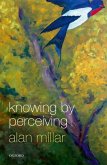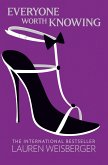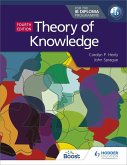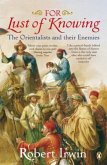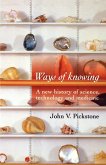Knowing How
Essays on Knowledge, Mind, and Action
Herausgeber: Bengson, John; Moffett, Marc A.
Knowing How
Essays on Knowledge, Mind, and Action
Herausgeber: Bengson, John; Moffett, Marc A.
- Broschiertes Buch
- Merkliste
- Auf die Merkliste
- Bewerten Bewerten
- Teilen
- Produkt teilen
- Produkterinnerung
- Produkterinnerung
This volume collects fifteen original essays examining the nature and significance of knowledge how.
Andere Kunden interessierten sich auch für
![Knowing by Perceiving Knowing by Perceiving]() Alan Millar (Professor Emeritus, Professor Emeritus, University ofKnowing by Perceiving112,99 €
Alan Millar (Professor Emeritus, Professor Emeritus, University ofKnowing by Perceiving112,99 €![Everyone Worth Knowing Everyone Worth Knowing]() Lauren WeisbergerEveryone Worth Knowing16,99 €
Lauren WeisbergerEveryone Worth Knowing16,99 €![The Knowing-Doing Gap The Knowing-Doing Gap]() Jeffrey PfefferThe Knowing-Doing Gap33,99 €
Jeffrey PfefferThe Knowing-Doing Gap33,99 €![Theory of Knowledge for the IB Diploma Theory of Knowledge for the IB Diploma]() Carolyn P. HenlyTheory of Knowledge for the IB Diploma44,99 €
Carolyn P. HenlyTheory of Knowledge for the IB Diploma44,99 €![Never Knowing Never Knowing]() Chevy StevensNever Knowing17,99 €
Chevy StevensNever Knowing17,99 €![For Lust of Knowing For Lust of Knowing]() Robert IrwinFor Lust of Knowing23,99 €
Robert IrwinFor Lust of Knowing23,99 €![Ways of Knowing Ways of Knowing]() John V. PickstoneWays of Knowing22,99 €
John V. PickstoneWays of Knowing22,99 €-
-
-
This volume collects fifteen original essays examining the nature and significance of knowledge how.
Hinweis: Dieser Artikel kann nur an eine deutsche Lieferadresse ausgeliefert werden.
Hinweis: Dieser Artikel kann nur an eine deutsche Lieferadresse ausgeliefert werden.
Produktdetails
- Produktdetails
- Verlag: Oxford University Press
- Seitenzahl: 416
- Erscheinungstermin: 1. August 2014
- Englisch
- Abmessung: 234mm x 156mm x 24mm
- Gewicht: 646g
- ISBN-13: 9780190200220
- ISBN-10: 0190200227
- Artikelnr.: 47863767
- Herstellerkennzeichnung
- Libri GmbH
- Europaallee 1
- 36244 Bad Hersfeld
- gpsr@libri.de
- Verlag: Oxford University Press
- Seitenzahl: 416
- Erscheinungstermin: 1. August 2014
- Englisch
- Abmessung: 234mm x 156mm x 24mm
- Gewicht: 646g
- ISBN-13: 9780190200220
- ISBN-10: 0190200227
- Artikelnr.: 47863767
- Herstellerkennzeichnung
- Libri GmbH
- Europaallee 1
- 36244 Bad Hersfeld
- gpsr@libri.de
John Bengson is currently a postdoctoral fellow in philosophy at the Australian National University and Assistant Professor of philosophy at the University of Wisconsin at Madison. His research is focused on issues in epistemology, philosophy of mind, and philosophy of action. Marc A. Moffett is Associate Professor of philosophy at the University of Wyoming. His research is focused on issues in epistemology, philosophy of language, philosophy of mind, and metaphysics.
* Contributors
* Acknowledgments
* The State of Play
* 1. Two Conceptions of Mind and Action: Knowing How and the
Philosophical Theory of Intelligence, John Bengson and Marc A.
Moffett
*
* Part I Ryle's Legacy
* 2. Rylean Arguments: Ancient and Modern, Paul F. Snowdon
* 3. Ryle's Knowing How and Knowing How to Act , Jennifer Hornsby
*
* Part II Philosophical Considerations
* 4. Practical Expertise, Julia Annas
* 5. Knowing How Without Knowing That, Yuri Cath
* 6. Knowledge How: A Unified Account, Berit Brogaard
* 7. Non-propositional Intellectualism, John Bengson and Marc A.
Moffett
* 8. Ideology and the Third Realm (Or, a Short Essay on Knowing How to
Philosophize), Alva Noë
*
* Part III The Linguistic Perspective
* 9. How to Resolve How To, Jonathan Ginzburg
* 10. Knowing How and Knowing Answers, David Braun
* 11. Knowledge Ascription by Grammatical Construction, Laura A.
Michaelis
*
* Part IV Implications and Applications: The Broader
* Acknowledgments
* The State of Play
* 1. Two Conceptions of Mind and Action: Knowing How and the
Philosophical Theory of Intelligence, John Bengson and Marc A.
Moffett
*
* Part I Ryle's Legacy
* 2. Rylean Arguments: Ancient and Modern, Paul F. Snowdon
* 3. Ryle's Knowing How and Knowing How to Act , Jennifer Hornsby
*
* Part II Philosophical Considerations
* 4. Practical Expertise, Julia Annas
* 5. Knowing How Without Knowing That, Yuri Cath
* 6. Knowledge How: A Unified Account, Berit Brogaard
* 7. Non-propositional Intellectualism, John Bengson and Marc A.
Moffett
* 8. Ideology and the Third Realm (Or, a Short Essay on Knowing How to
Philosophize), Alva Noë
*
* Part III The Linguistic Perspective
* 9. How to Resolve How To, Jonathan Ginzburg
* 10. Knowing How and Knowing Answers, David Braun
* 11. Knowledge Ascription by Grammatical Construction, Laura A.
Michaelis
*
* Part IV Implications and Applications: The Broader
* Contributors
* Acknowledgments
* The State of Play
* 1. Two Conceptions of Mind and Action: Knowing How and the
Philosophical Theory of Intelligence, John Bengson and Marc A.
Moffett
*
* Part I Ryle's Legacy
* 2. Rylean Arguments: Ancient and Modern, Paul F. Snowdon
* 3. Ryle's Knowing How and Knowing How to Act , Jennifer Hornsby
*
* Part II Philosophical Considerations
* 4. Practical Expertise, Julia Annas
* 5. Knowing How Without Knowing That, Yuri Cath
* 6. Knowledge How: A Unified Account, Berit Brogaard
* 7. Non-propositional Intellectualism, John Bengson and Marc A.
Moffett
* 8. Ideology and the Third Realm (Or, a Short Essay on Knowing How to
Philosophize), Alva Noë
*
* Part III The Linguistic Perspective
* 9. How to Resolve How To, Jonathan Ginzburg
* 10. Knowing How and Knowing Answers, David Braun
* 11. Knowledge Ascription by Grammatical Construction, Laura A.
Michaelis
*
* Part IV Implications and Applications: The Broader
* Acknowledgments
* The State of Play
* 1. Two Conceptions of Mind and Action: Knowing How and the
Philosophical Theory of Intelligence, John Bengson and Marc A.
Moffett
*
* Part I Ryle's Legacy
* 2. Rylean Arguments: Ancient and Modern, Paul F. Snowdon
* 3. Ryle's Knowing How and Knowing How to Act , Jennifer Hornsby
*
* Part II Philosophical Considerations
* 4. Practical Expertise, Julia Annas
* 5. Knowing How Without Knowing That, Yuri Cath
* 6. Knowledge How: A Unified Account, Berit Brogaard
* 7. Non-propositional Intellectualism, John Bengson and Marc A.
Moffett
* 8. Ideology and the Third Realm (Or, a Short Essay on Knowing How to
Philosophize), Alva Noë
*
* Part III The Linguistic Perspective
* 9. How to Resolve How To, Jonathan Ginzburg
* 10. Knowing How and Knowing Answers, David Braun
* 11. Knowledge Ascription by Grammatical Construction, Laura A.
Michaelis
*
* Part IV Implications and Applications: The Broader


